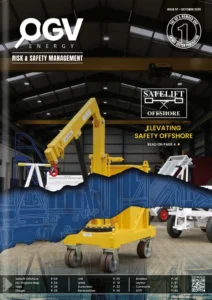ShellExpro Contract Award for “FPSO Curlew” Deconstruction at AF Gruppen facilities at Vats, Norway
Unable to meet Transfrontier Shipment of Waste Regulations for NORM, UK joint-venture, Shell Expro (Shell and Exxon) announced on Friday, 12 June 2020 that it had awarded the contract to complete the decommissioning of the former oil and gas production installation to an experienced Norwegian company, AF Gruppen, to be carried out at Vats, Norway. The vessel is currently moored in the Port of Dundee, having been decontaminated as far as possible with regard to LSA scale, though complete removal of this contaminant was not possible and the original plan to ship the “clean” vessel to shipbreaking and scrap processing facilities in Turkey had to be abandoned. All decommissioning operations plans come under the remit of UK/Scottish regulatory bodies, primarily, BEIS, OGA and SEPA and must be approved prior to shipment.
The loss of such a contract to the fledgling UK decommissioning industry represents a dangerous precedent and a serious blow to the UK supply chain and yards, which have recently received considerable UK Government funding and political support to boost the sector’s prospects, not least internationally. Significant potential job opportunities will be lost along with the associated reputational uplift and anticipated economic boost to both national and local economies and communities.
UKCS decommissioning projects are normally 100% funded by the designated licence holders of the asset in question (as per the Petroleum Act 1998) and overseen by OGA/BEIS(OPRED) and subject to a complex structure, which primarily relies on the claiming of tax reliefs from revenues pre-paid to the UK Government and controlled by HM Treasury. At no time (except in very severe cases of failure) does the UK Taxpayer provide any decommissioning funding for projects.
Curlew Decommissioning – What is known?
Curlew is An FPSO (Floating Production Storage and Offload Vessel) – as such storage tanks will have crude oil and production operations contaminants within them. This inventory will include NORM (Naturally Occurring Radioactive Materials) estimated at 182 tonnes (Shell Curlew Decommissioning Programme)
Vessel was demobilised from UKCS operating location to be taken to harbour facilities for clean-up and then onward transit to Turkey, for demolition and disposal
Vessel brought into Port of Dundee for ‘cleaning’ contract in June 2019
Reported 100 jobs created to effect works.
Some ‘safety’ issues encountered – Shell stopped job once on reported “safety grounds”
Contamination found to require access to vessel’s structure – which would impair integrity of hull, preventing onward towing to Turkey.
Shell Expro advises in Feb 2020 that “Dundee works” will be suspended and job finished “elsewhere”.
Press report Dundee “not having dedicated ship breaking facilities” as a contributing factor for not completing works in Dundee. (Feb 2020)
AF Gruppen announces ‘contract award’ for disposal and demolition at VATS yard Norway. (June 2020)
No evidence of transparent, “Competitive” Tendering process for the works, as per industry association, Oil & Gas UK’s, guidelines. Both Shell and Exxon are prominent members of this trade association and claim to support open and transparent engagement with the supply chain
Many UK yards not aware of potential works, nor invited to participate in either discussions with Shell Expro, nor an ITT (Invitation To Tender), as per industry best practice and promoted by the Oil & Gas Authority and National Audit Office (accounting requirement of receiving tax reliefs for decommissioning expenditure).
VATs facility offers no better facilities for ship breaking than Dundee (i.e. no drydock) – unclear what ‘technical advantage’ is being gained moving to Vats, Norway. No detailed scope, nor methodology for the work has been made public.
UK drydocks (that have already received UK Government funding and support) could do these ship breaking/demolition works, yet appear to have been ignored, Notably – Kishorn Port; Able at Teeside; and, Global Energy at Nigg, for example.
Not clear why the removal, processing, quayside storage and transboundary shipment of NORM is being allowed as UK can handle this waste stream – so expectations should be to require collection, return shipment and disposal operations in the UK. SEPA have to agree the movement of any waste shipments, including NORM.
No evidence of LME (Local Multiplier Effect) being applied to assess wider impacts of retaining works in the UK as a policy.
Source: Scientia et Sagacitas Limited, Aberdeen
Read the latest issue of the OGV Energy magazine HERE.
Published: 16-06-2020














